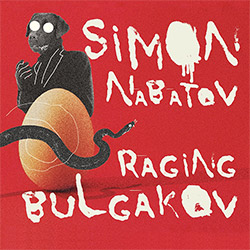
A cursory look at the discography of the Russian-born pianist Simon Nabatov shows that he most frequently records with relatively small groupings, trios being most common, and one solitary octet being the largest. Significantly, that octet, which included such esteemed players as Frank Gratkowski, Nils Wogram, Ernst Reijseger, Cor Fuhler and Phil Minton, produced a ninety-minute piece based on the texts of the Russian writer Daniil Kharms which was released as A Few Incidences (Leo, 2005). That album completed Nabatov's "Russian trilogy" alongside Nature Morte (Leo, 2001) which was based on Joseph Brodsky's poem of the same title, and The Master and Margarita (Leo, 2001), based on Mikhail Bulgakov's novel of the same title.
Now, with the double-CD Raging Bulgakov, Nabatov has resurrected his fascination with Russian literature, although, for decades, he has split his time between Cologne and New York. Each of the discs focusses on a single Bulgakov satire published in 1925, years before "The Master and Margarita" was published in uncensored form in 1973; disc one features "Heart of a Dog" and disc two "The Fatal Eggs", each being performed by a different septet, with Nabatov himself on piano, Axel Porath on viola, Nathan Bontrager on cello and Dominik Mahnig on drums being the only ever-present musicians. The seven pieces that comprise "Heart of a Dog" were all recorded in LOFT, Cologne, on November 5th 2022, the eight that comprise "The Fatal Eggs" at the same location, eleven days later.
The music was all composed by Nabatov and is mainly instrumental without any vocals or narration. Consequently, it serves to convey the atmosphere of both pieces rather than their plots; in fact, one has to refer to the album's sleeve notes to get some sense of Bulgakov's original writing. The music may persuade some listeners to read Bulgakov's original satires. However, throughout both pieces, the septets produce music which is enthralling in its own right and requires no knowledge of Bulgakov to be appreciated. Although very different, the two pieces are enjoyable enough to be habit-forming, and the album as a whole is one of Nabatov's best.
Comments and Feedback:
|



